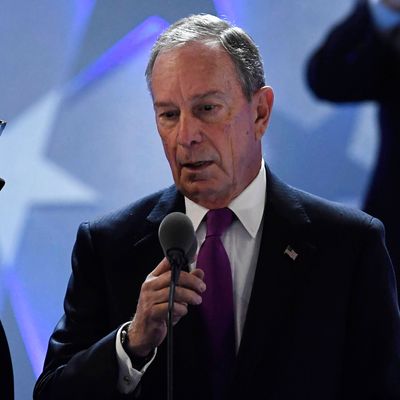
The first two nights of the Democratic convention revolved around the conventional liberal-democratic themes of economic opportunity and social equality, the latter of which dovetailed with Hillary Clinton’s status as potentially the first female president. The third night drove home a simple theme and more historically profound point: Donald Trump is dangerously unfit for the presidency.
The early speeches featured a procession of military veterans — retired Navy admiral John Hutson, Marine captain Kristen Kavanaugh, and former CIA Director and Secretary of Defense Leon Panetta. These speakers lacked passion, but seemed genuinely desperate to communicate the point that a Trump presidency would do irrevocable damage to the stability of American government. It was not a message to voters who are angry and desperate for change. It was a warning that Trump would endanger all they hold dear. They emphasized Trump’s promise to order the military to commit war crimes, his smear of John McCain’s war heroism, his admiration for dictators — statements that ought to horrify Democrats as well as Republicans. (The appeal to authority and stability of the American military seemed to set off the Bernie Sanders die-hards in the audience, who interrupted with “No more war!” chants, bringing home the degree to which the forces of chaos were outsiders in the Democratic Party, and had gained control of the GOP.)
Joe Biden and Michael Bloomberg delivered complementary addresses to two blocs of swing voters. Biden gave a patriotism-laden message to blue-collar whites, telling them, “No major-party nominee in the history of this nation has ever known less and been less prepared to handle our national security.” Bloomberg instead tailored his message to college-educated swing voters, or small-business owners, the prosperous middle- and upper-middle-class center. Bloomberg identified himself from the outset as a non-Democrat who did not endorse the party’s platform, which lent more authority to his plea. Tim Kaine blended both approaches, peppering his speech with references to Republicans who couldn’t support Trump, from his father-in-law to Barbara Bush, a former McCain economist, and John Kasich.
But it was Bloomberg, the non-Democrat, who boiled the stakes of the election down to its essence. “We must unite around the candidate who can defeat a dangerous demagogue,” he said. His ad-libbed conclusion was rousing even in its almost-comic lack of praise for the nominee he endorsed: “Let’s elect a sane, competent person.” The bar has been set so low, and the stakes are so high. That is the election in its essence.






























